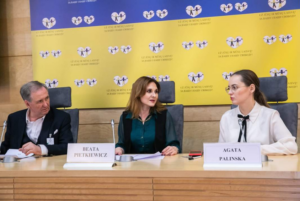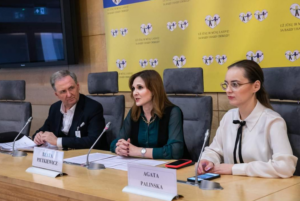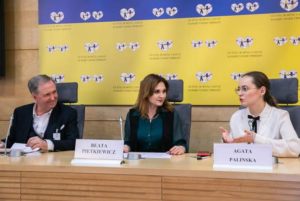- 2024/03/15
Conference on the original spelling of first and last names. Next steps in the fight for the rights of national minorities in Lithuania

The European Foundation of Human Rights (EFHR) is actively working to restore the original spelling of first and last names for members of the Polish national minority in official Lithuanian documents. These efforts include advocating for the use of diacritical marks that have not been recognized in the Lithuanian law on the spelling of names and surnames.
On March 7, 2024, a press conference was held regarding the issue of the original spelling of first and last names in identity documents. The event was initiated by MP Beata Pietkiewicz. Alongside her, EFHR lawyer Agata Palinska and Professor Jarosław Wołkonowski also spoke. The conference focused on disputes concerning the right of non-Lithuanian citizens of the Republic of Lithuania to write their names and surnames using diacritical marks that do not appear in the Lithuanian alphabet.
The amendment adopted in 2022 is incomplete—it allows the use of the letters “w,” “q,” and “x” as well as digraphs (such as “rz,” “cz,” “sz,” “nn”), but not diacritical marks that do not exist in the Lithuanian alphabet, despite their significance in languages like Polish. As a result, letters such as “ą” and “ę” are permitted, while others like “ń,” “ć,” or “ó” are not. Consequently, only some citizens with foreign-language surnames can fully exercise their right to identity. Among those still unable to write their names using their original characters are members of Lithuania’s largest national minority—the Poles.
During the conference, an EFHR representative called for further legislative changes to allow the use of original name spellings, including diacritical marks. The continuation of legislative efforts and further actions to expand rights in this area are essential to ensuring equality and full respect for individual rights, regardless of national or ethnic background.
During the event, Member of Parliament Beata Pietkiewicz expressed her support for amending the regulations on the spelling of names and surnames in official documents, emphasizing that this is crucial for preserving the national identity of minorities. She highlighted that implementing such changes would not threaten the Lithuanian language but would simply allow for greater respect for individual rights.
The Case of Professor Jarosław Wołkonowski – A Key Example of the Fight for Minority Rights
During the conference, reference was also made to the important case of Professor Jarosław Wołkonowski, which is being handled by the EFHR. This case is one of the most significant examples of the fight for the right to the original spelling of names and surnames. As a result of a decision by the Vilnius District Court on June 1, 2022, Professor Wołkonowski was granted the right to use the letter “ł” in his first and last name. This decision appeared to be final, as it was not appealed by either party.
However, the situation changed when the Prosecutor General’s Office of the Republic of Lithuania filed a request to reopen the case, arguing that the court’s decision violated regulations on the use of non-Lithuanian diacritical marks. The Vilnius City District Court reopened the case and referred it to the Constitutional Court, which, in its ruling on December 28, 2023, stated that Lithuanian regulations restricting the spelling of names and surnames are in line with the Constitution. However, it also indicated that these regulations could be expanded if the State Commission of the Lithuanian Language grants approval.
Despite this, the Commission maintains its position, restricting the use of names and surnames in a form inconsistent with the Lithuanian alphabet to only exceptional cases.
The decision of the Vilnius City District Court on March 4, 2024, withheld the previous authorization and changed the spelling of Professor Wołkonowski’s name to “Jaroslaw Wolkonowski.” With the support of the EFHR, Professor Wołkonowski intends to appeal the ruling, arguing that his right to privacy and national identity has been violated, and that Lithuania’s international obligations regarding the protection of minority rights have been disregarded.
EFHR Continues the Fight for Respecting Cultural Diversity
In its activities, the EFHR aims to protect the rights of national minorities in Lithuania, with a particular focus on the right to retain the original spelling of names and surnames. A name is not just a formal entry in official documents but a fundamental part of an individual’s identity. Restrictions in this regard violate human rights, including the right to private and family life.
Due to numerous legal challenges, EFHR not only represents citizens in courts but also conducts informational campaigns and legal consultations aimed at raising public awareness about the possibility of changing the spelling of first and last names. Since May 2022, around 300 people belonging to national minorities have exercised their right to adjust the spelling of their names, demonstrating growing interest in this issue.
Summary and Next Steps
The press conference on March 7, 2024, was an important step in raising awareness about the spelling of first and last names in Lithuania, as well as a platform to express support for reforms aimed at protecting the rights of national minorities.
EFHR will continue its efforts, both by supporting individual cases, such as that of Prof. Jarosław Wołkonowski, and by conducting social campaigns to encourage legislative changes. We strongly hope that our efforts will bring Lithuania closer to respecting the national and cultural identity of individuals and that members of national minorities will have the opportunity to use the full and correct spelling of their names. The foundation provides free legal assistance daily, as well as consultations on how to prepare the necessary application at the civil registry office. Information about the procedure for changing the spelling of first and last names can be found in informational materials available on the EFHR website: https://bit.ly/3yZsK45. Anyone interested in obtaining legal assistance is encouraged to contact us directly via email at info@efhr.eu or by phone at + (370) 691 50 822.
Translated by Julia Falisz within the framework of a traineeship programme of the EFHR
Photo Facebook/ Beata Pietkiewicz







